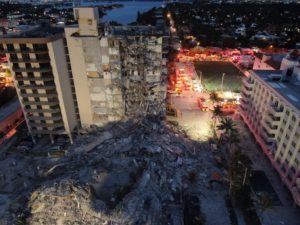By Jacob Kamaras

LA JOLLA, California — For more than two weeks, the condo building collapse in Surfside, Florida, has remained an inescapable fixture in Jewish and mainstream media alike.
Of course, a tragedy of this magnitude merits the abundant coverage. But at this stage, we cannot ignore the emotional toll of the headlines.
On July 7, the search-and-rescue operation called off, with 86 people remaining unaccounted for at the time. For days beforehand, it had already seemed unfathomable that anyone not yet found could have survived the collapse, but such individuals were still reported as “missing” while only those identified were pronounced dead.
Now, the official death toll stands at 78 as of this writing — with 62 routinely identified as “missing” or “unaccounted for” in news reports despite the end of the search. And I cannot stop thinking that although it might seem best to always hold out hope, what is the emotional toll of continuing to describe these individuals as potentially alive? What false sense of hope are we creating for families and friends of the victims?
Local authorities’ hands are tied; they cannot pronounce unfound individuals to be dead at this stage. But media outlets can choose what to report — and currently, they are choosing to reinforce an unrealistic, misleading, and hurtful picture.

Sadly, bad news has become all too commonplace in recent years. Jewish journalists are faced with reporting on an ongoing surge in antisemitism, including attacks such as the synagogue shootings in Pittsburgh and Poway which previously felt like they could never occur in this country. The media at-large remains consumed by a pandemic that has claimed more than 600,000 lives in America.
In the reporter’s or editor’s seat, the natural instinct is to produce as much content as possible on such events, for a number of reasons. We need to tell the top stories of the day. We need to report on what our audience is looking to read about. We need to drive traffic to our websites. Often, we consider this reporting an important community service. And we try to recount not just the facts, but also the human side of the story.
But when it comes to Surfside, perhaps it is time to reflect more deeply on the human aspect and ask ourselves: Is our reporting actually counterproductive on a human level? For a moment, let’s at least consider the emotional toll of a headline before clicking “publish.”
*
Jacob Kamaras is Managing Editor of the San Diego Jewish World.